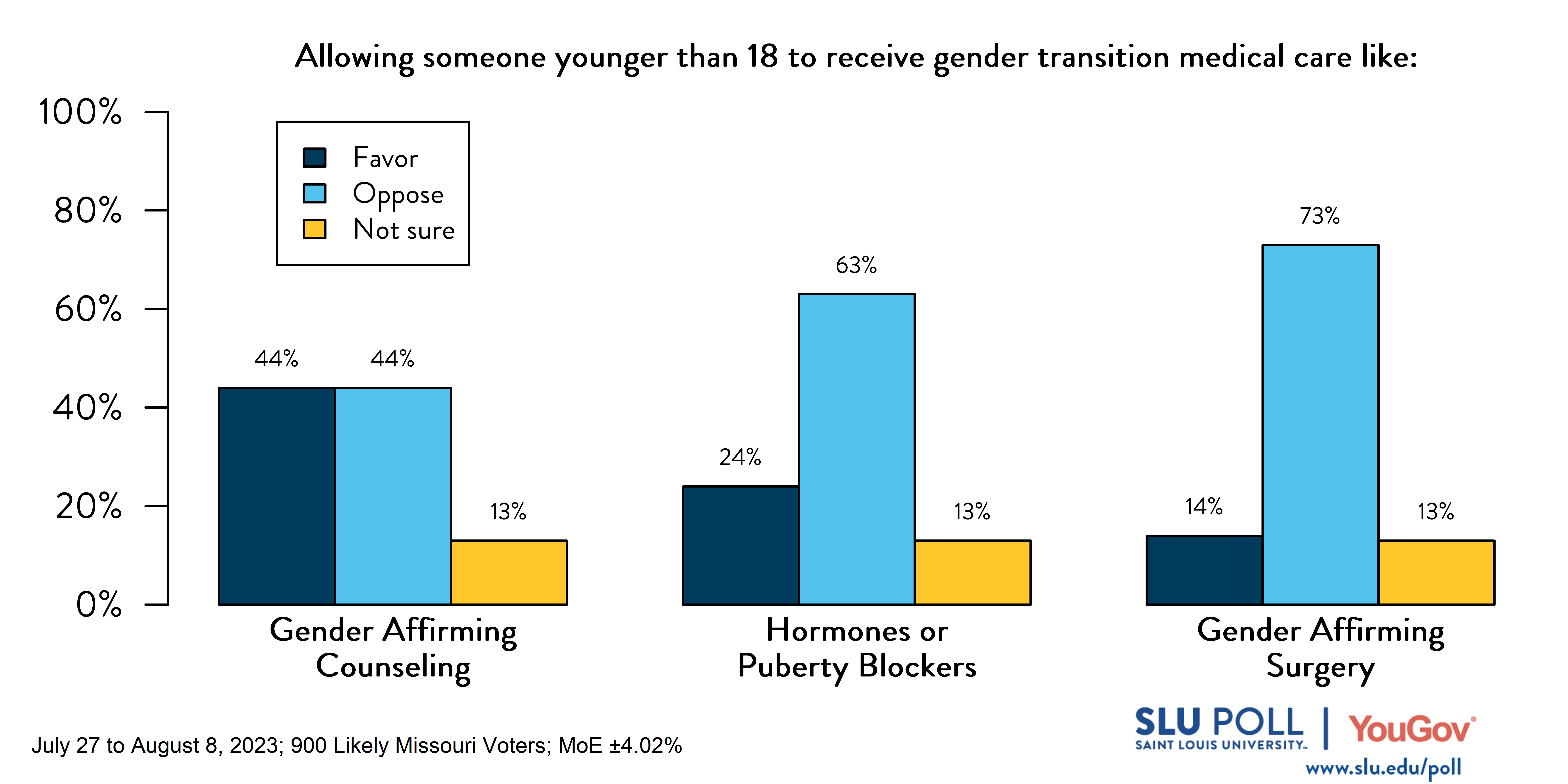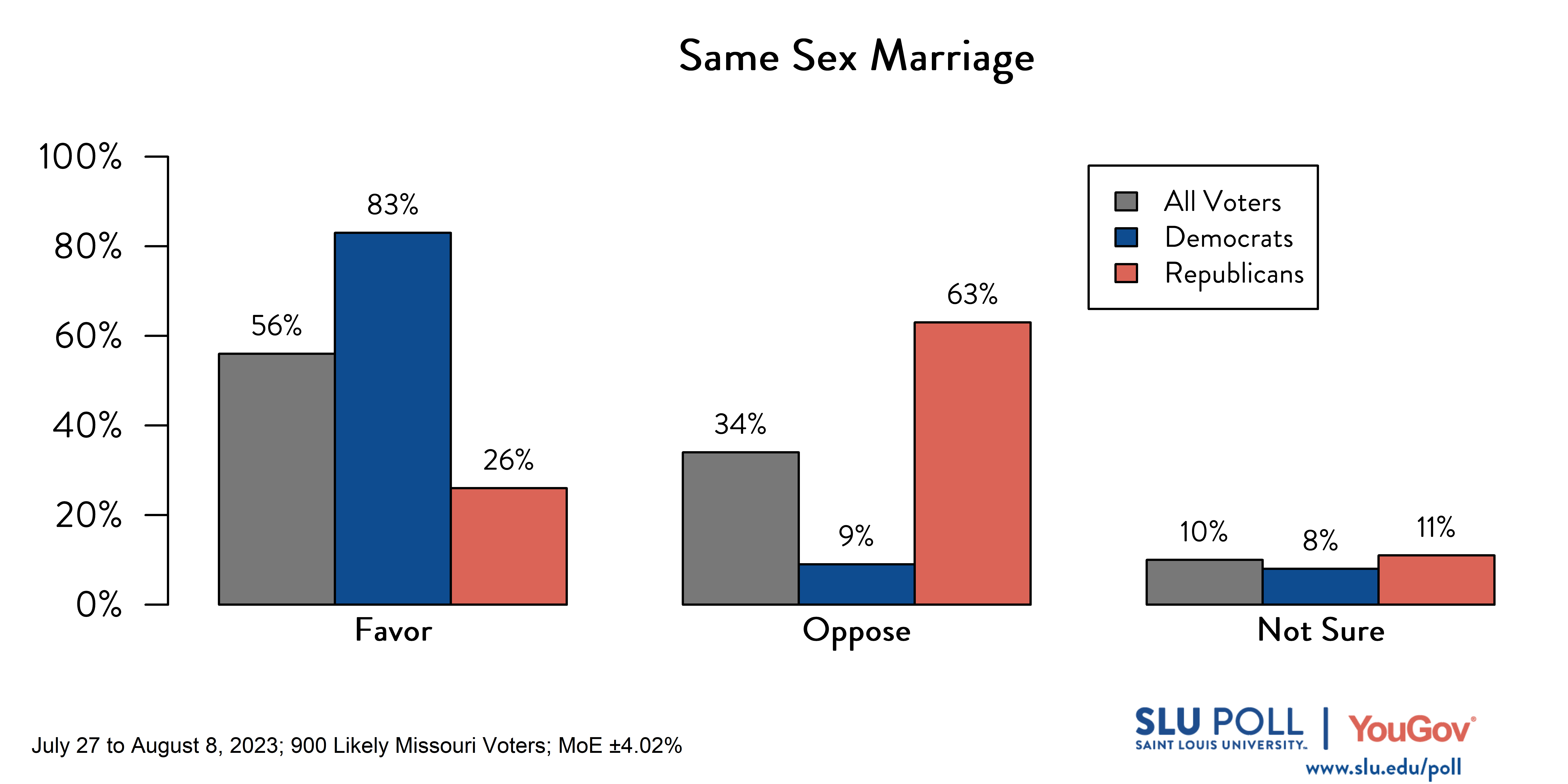SLU/YouGov Poll Analysis: Missouri Voters Support Restricting Transgender Medical Care for Minors
SLU's Kaitlin Klasen provides analysis on the August 2023 SLU/YouGov poll results.
State legislatures across the country are debating and passing an unprecedented amount of bills that restrict gender transition medical care for individuals under 18 years old. Restrictions on transgender care increasingly gained Missouri lawmakers’ attention this year, particularly following allegations made against Washington University’s Transgender Center. Responding to these allegations, Missouri Attorney General, Republican Andrew Bailey, announced a set of emergency rules restricting transgender healthcare in March. The ACLU challenged Bailey’s authority to implement these emergency rules, but the emergency rules were withdrawn after the state house voted 108-50 to the “Missouri Save Adolescents From Experiment (SAFE) Act.” The Missouri SAFE Act makes it illegal for healthcare providers to perform gender transition surgeries on minors and bans cross-sex hormones or puberty-blocking drugs to a minor in gender transition. Governor Mike Parson signed the bill into law behind closed doors in June.
SAFE Act supporters often portray gender transition medical care as risky medical experiments. They argue that these policies “protect children” because those under the age of 18 are too young to make decisions about gender transition medical care. Despite being less restrictive than measures being passed in some other states, Democrats and some members of the LGBTQ+ community argue that these restrictions can be detrimental to transgender youth, especially for their mental health. They also argue that such laws can increase the risks to physicians who continue to provide the gender transition healthcare that most medical organizations deem safe.
The SAFE Act does not restrict all transgender care. Most people over the age of 18 will still have access to transgender healthcare, and minors who received such treatment prior to August 28, 2023 are exempt from the bill’s restrictions. The SAFE Act does not prevent providers from referring patients out-of-state or stop patients from seeking medications via telehealth. Mental health services for gender dysphoria are still allowed, as well as private insurance coverage for gender-affirming medical care, but transgender healthcare will not be covered by Medicare. The SAFE Act’s restrictions on puberty blockers and hormone therapy expire in August 2027 as part of a compromise between Democrats and Republicans in the Missouri Legislature. The ban on surgeries, however, does not expire.
The August 2023 SLU/YouGov Poll found that most Missouri voters appear to favor provisions
in the SAFE Act that restrict gender-affirming care for minors. When asked whether
they favored or opposed allowing gender transition medical care for people under 18
like gender-affirming surgery, only 14% of Missouri voters were in favor and 73% were
in opposition. Similarly, when asked whether they favor or oppose allowing someone
younger than 18 to hormone therapy or medication that can temporarily prevent the
effects of puberty, only 24% percent of voters were in favor and 63% were in opposition.
Voters were more split on whether minors should be able to receive gender-affirming
counseling, with 44% in favor and 44% opposed.
Additionally, the SLU/YouGov Poll found a large contrast between Democrats and Republicans
when asked about provisions found in the SAFE Act. A majority of Republicans also
favored restricting various types of gender transition medical care more consistently
than Democrats. When asked whether they favor or oppose allowing someone younger than
18 to have gender-affirming surgery, 94% of Republicans opposed compared to 45% of
Democrats. Likewise, when asked whether they favor or oppose allowing someone younger
than 18 to hormone therapy or medication that can temporarily prevent the effects
of puberty, 92% percent of Republicans opposed compared to 25% of Democrats. The largest
contrast was found when voters were asked whether they favored or opposed allowing
gender transition medical care for people under 18 like gender-affirming counseling:
72% of Republicans were in opposition compared to only 10% of Democrats.
The SLU/YouGov Poll also found that older Missouri voters appear to favor the provisions in the SAFE Act restricting gender-affirming health care for minors more than younger voters. 25% of voters aged 18-29 favor allowing minors to receive gender-affirming healthcare compared to only 9% of those between the ages of 45-64. Additionally, when asked whether they favor or oppose allowing those younger than 18 to receive hormone therapy or medication that can temporarily prevent the effects of puberty, 41% of voters aged 18-29 favored and only 17% of voters 65+. Voters across all age groups favored allowing minors to receive gender-affirming counseling more than the other types of gender transition medical care asked about. However, there was still a contrast between younger and older voters with 63% of voters aged 18-29 in favor and 37% of those aged 65 or older.
This analysis is based on data from the August 2023 SLU/YouGov poll and reflects the opinion of the author.



















